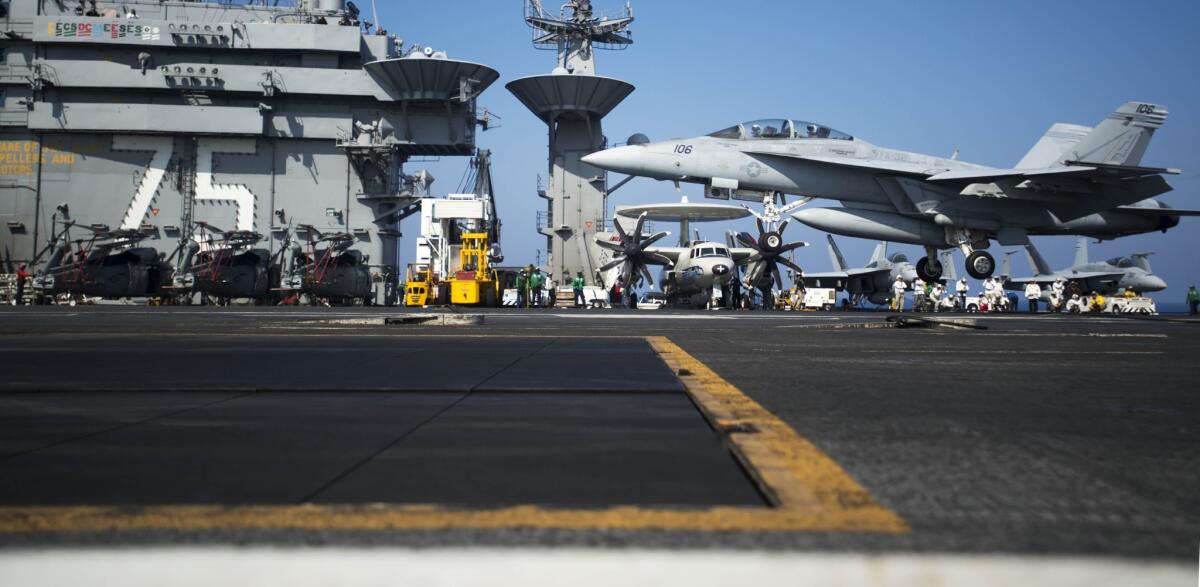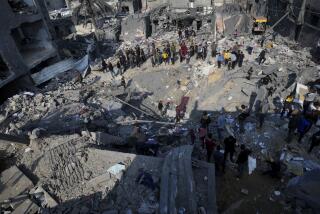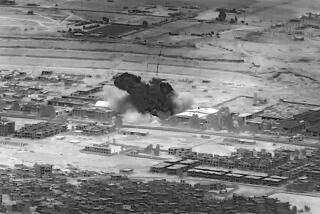Why Syria’s chemical weapons stockpile is safe from airstrikes

- Share via
Syrian President Bashar Assad wields command over the world’s biggest stockpile of chemical weapons, international security experts say, and he is expected to emerge from any punitive Western airstrikes with his arsenal intact.
With an estimated 50 storage sites, many situated in or near urban centers, any attempt to destroy or degrade the Assad government’s supply of poison gases and nerve agents would require a massive invasion of ground forces that no nation considered part of the emerging “coalition of the willing” would be likely to support.
Even if U.S. and allied intelligence have precisely located some of the stores of sarin, mustard or VX gas, analysts say, the likelihood of a successful airstrike is slim because of Assad’s powerful air defenses and the risk of bombed chemical stores unleashing their deadly gases.
As the United States and other nations weigh the appropriate response to Assad’s suspected use of chemical weapons in an attack last week that killed hundreds of Syrian civilians, Western military strategists have reportedly concluded there is no way to target the weapons of mass destruction with airstrikes. With no appetite in the United States or Europe for the scale of mission necessary to locate, capture and neutralize the Damascus government’s chemical weapons, the punitive strikes are expected to be more symbolic than effective in preventing future use of WMD.
“If we were to go after the storage sites, our intel on this stuff, if our track record is any judge, is not perfect, to say the least,” said Steven Bucci, a former Army Green Beret officer and senior Pentagon official now directing foreign policy studies at the Heritage Foundation. He alluded to the faulty reconnaissance on Saddam Hussein’s purported caches of weapons of mass destruction that prompted the 2003 U.S.-led invasion of Iraq.
A more logical target for airstrikes would be chemical agent production facilities, where bombs or missiles would have a better chance of destroying the substances before they are weaponized, Bucci said.
“That said, what the heck does that do for you, considering that they have a bazillion tons of this stuff already?” he said, branding Syria “the superpower of chemical weapons.”
Steven Weber, a UC Berkeley political science professor with expertise in international security and defense issues, describes the objective of taking out Syria’s WMD as too daunting and dangerous.
“There is always a risk of unintended dispersal of chemical agents in a missile strike. To do that reasonably safely, you would have to know exactly what is stored at the site, where the people are in the area, what the winds are like. Otherwise you run the risk of creating toxic plumes that would kill people,” Weber said. “And you probably can’t get to all of them, so it may not make sense to bother taking out only some of them unless you can ensure that any collateral damage is really low.”
With so many variables and unknowns, the odds of eliminating Assad’s chemical weapons capability are minimal, says Raymond Zilinskas, director of chemical and biological weapons programs at the James Martin Center for Nonproliferation Studies in Monterey.
Factoring the probability of detecting real weapons sites from decoys, acquiring the correct target, successfully launching the munitions and destroying the right contents probably drops the chances for a mission accomplished below 10%, the biotechnology expert estimates.
Charles P. Blair of the Federation of American Scientists this week posted to the Bulletin of the Atomic Scientists a multimedia report on Syria’s chemical weapons, their origins and incidents of suspected use. The Johns Hopkins University and George Mason University biodefense scholar also pointed out that Syria is one of only seven countries that hasn’t signed the 1993 Chemical Weapons Convention that outlaws production, possession and use of the weapons.
Making a preemptive strike on Assad’s chemical arsenal, which Damascus has built up over 40 years, probably would backfire strategically “in this kind of highly propagandized, politicized war,” warned Thomas H. Henriksen, a senior fellow at Stanford’s Hoover Institution who studies insurgencies, rogue states and defense affairs. Any civilians killed by the inadvertent release of poison gas from the bombings would be displayed by the Syrian government as evidence of the perfidy of the United States and its allies, he said.
And striking aggressively to eliminate weapons to prevent their future use is a gamble that won’t pay off if civilian casualties are inflicted, said Henriksen, a veteran author on U.S. foreign policy who also teaches at the U.S. Joint Special Operations University.
“Even if you think in the long term that it is a good thing to eliminate these weapons, if it blows up and lots of innocent people are killed, no one is going to think about what might have happened later,” he said. “All anyone will care about is what has happened in the current time.”
ALSO:
Militants in Afghanistan launch attacks against NATO
Iran still progressing on its nuclear program, U.N. says
Ex-Salvadoran commander suspected in priests’ killings jailed in U.S.
A foreign correspondent for 25 years, Carol J. Williams traveled to and reported from more than 80 countries in Europe, Asia, the Middle East and Latin America.
More to Read
Sign up for Essential California
The most important California stories and recommendations in your inbox every morning.
You may occasionally receive promotional content from the Los Angeles Times.











